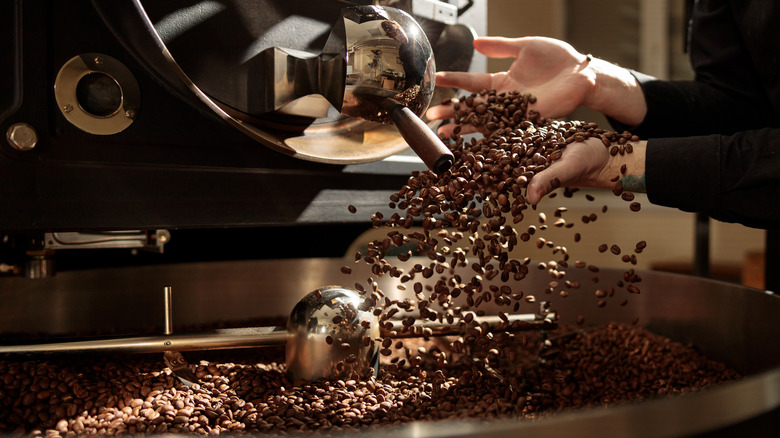How Does Nitrogen Flushing Help Preserve Coffee?
Fresh is a word that often gets used to describe coffee. People want to know if their cup of joe was freshly brewed, freshly ground, and freshly roasted.
One of the ultimate enemies of this freshness is oxygen. While we might need this gas to survive, it also tends to make food quality degrade. According to Joy Resolve, exposure to oxygen causes coffee's flavors to go stale. The wonderful flavors and aromas usually associated with coffee come from a wide variety of oils and chemical compounds that are collectively referred to as "solubles." CoffeeTec points out that the minute coffee is roasted, it's a race against the clock to keep these solubles intact. After roasting, coffee immediately starts putting out CO2 that is easily replaced by oxygen (via Café Altura).
When coffee's solubles are exposed to oxygen, they begin to break down. The longer your roasted coffee is exposed to air, the fewer solubles will be present in the final cup, and the blander your coffee will taste. High-end producers have learned to deal with this problem though, and crafted creative solutions to keep oxygen away from coffee.
Nitrogen keeps oxygen away from coffee beans
Coffee retailers use a process known as "nitrogen flushing" to ensure that there is a safe distance between the roasted coffee and any oxygen molecules, according to CoffeeTec. This is done by pumping nitrogen into a vacuum-sealed bag while the coffee is being poured in. The bag is then sealed, and equipped with a one-way valve to let excess gas out, without letting any oxygen in. Nitrogen is used because it is a non-reactive, odorless, and tasteless gas that won't cause any of coffee's solubles to break down, or affect the flavor.
Perfect Daily Grind points out that this is the same process used to keep potato chips safe and fresh in transit. It's also the reason your chip bag is never fully filled. Roasters purchase nitrogen canisters to use during packaging to accomplish this feat of food preservation. CoffeeTec says that this allows roasted coffees to stay fresh for up to six months from their roast date as long as the bag remains sealed. Once opened though, the freshness clock is ticking, and after a little more than a week, the coffee bean's aromas and flavors will start to degrade.
So the next time you're enjoying a cup of coffee that tastes fresh, even though the beans may have been roasted a month earlier, you have nitrogen flushing to thank for it.

